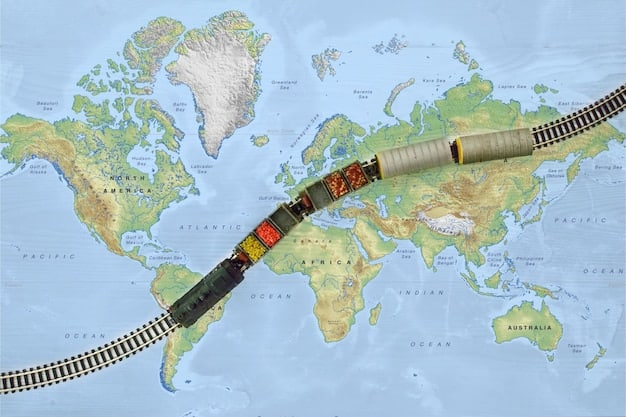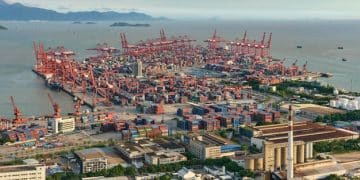Analyzing China’s Economic Policies & Impact on US National Security in 2025

Analyzing the Impact of China’s Economic Policies on US National Security in 2025 requires understanding China’s economic strategies, their potential effects on US economic and military strength, and the geopolitical implications for the United States.
The United States faces a complex geopolitical landscape, with analyzing the impact of China’s economic policies on US national security in 2025 becoming increasingly critical. These policies hold significant implications.
Understanding China’s Economic Policies
China’s economic policies are multifaceted, aiming to bolster its global influence. These policies range from trade and investment strategies to technological advancements and currency manipulation. Understanding these policies is crucial to assess their potential impact on US national security.
Key Aspects of China’s Economic Strategy
China’s economic approach integrates various strategies that collectively strengthen its global position.
- Belt and Road Initiative: Expands infrastructure and trade networks across Asia, Africa, and Europe.
- Made in China 2025: Aims to become a world leader in advanced manufacturing technologies.
- Digital Silk Road: Focuses on enhancing digital infrastructure to dominate the digital economy.
These initiatives represent China’s commitment to reshape global economic dynamics.

The implications for the US are significant, potentially challenging its economic and technological dominance.
Potential Economic Impacts on the United States
China’s economic ascent poses multifaceted challenges to the United States, influencing trade, investment, and technological innovation. Understanding these channels is crucial to evaluating the overall impact on US national security.
Trade and Investment Dynamics
China’s trade practices and investment strategies can have both positive and negative effects on the US economy.
- Increased Competition: Chinese exports may undercut domestic industries, leading to job losses.
- Market Access: US companies could potentially gain access to a large Chinese consumer base.
- Trade Imbalances: Persistent trade deficits with China could weaken the US economy.
The US must navigate these factors carefully to maintain economic stability and competitiveness.
The US needs strategic trade policies to balance these impacts.
Military and Technological Implications
China’s economic policies play a pivotal role in modernizing its military and advancing its technological capabilities. These advancements bear significant implications for US national security.
Military Modernization through Economic Growth
Economic strength directly fuels China’s military modernization, enhancing its ability to project power globally.
- Increased Defense Spending: China’s growing GDP enables greater investment in military technologies.
- Dual-Use Technologies: Economic policies promote the development of technologies with both civilian and military applications.
- Cyber Warfare Capabilities: Economic resources support the expansion of China’s cyber warfare capabilities.
The US must vigilantly monitor and adapt to China’s evolving military strength.
China’s economic investments in technology are rapidly closing the gap.
Geopolitical Consequences for the US
China’s economic policies reshape the geopolitical landscape, challenging the US-led international order. These shifts necessitate a strategic response to safeguard US interests.
Shifting Alliances and Influence
Economic leverage allows China to build alliances and exert influence in regions critical to US interests.
China is actively expanding its sphere of influence.
- Diplomacy and Aid: Economic aid is used to strengthen political ties with strategically important countries.
- International Organizations: China seeks greater influence within international bodies to advance its agenda.
- Regional Partnerships: China fosters regional partnerships that bypass traditional US alliances.
The US must actively engage in diplomacy to counteract China’s growing influence.

Maintaining strong alliances and fostering new partnerships in key regions is crucial.
Cybersecurity and Economic Espionage
China’s economic policies are intertwined with cybersecurity threats and economic espionage. These activities pose significant risks to US intellectual property and economic stability.
Protecting Intellectual Property
China’s actions increasingly threaten US technological advantages.
The US must strengthen its cybersecurity defenses and legal frameworks to protect its assets.
- Intellectual Property Theft: China is accused of widespread theft of US intellectual property to boost its industries.
- Cyber Attacks: State-sponsored cyber attacks target US companies and government agencies.
- Supply Chain Vulnerabilities: Economic dependencies create vulnerabilities in critical supply chains.
Robust monitoring and enforcement measures are essential to mitigate these risks.
International collaboration is also necessary to address these global challenges.
Strategic Responses for the United States
To effectively address the challenges posed by China’s economic policies, the United States must develop comprehensive strategic responses spanning economic, military, and diplomatic domains. These coordinated actions will safeguard US national security.
Strengthening Economic Competitiveness
Boosting domestic innovation and infrastructure is vital to maintaining a competitive edge.
Investing in education, research, and technology is critical.
- Innovation and Technology: Strategic investment in advanced technologies can ensure US leadership.
- Infrastructure Development: Modernizing infrastructure improves economic efficiency and resilience.
- Workforce Training: Preparing the workforce for emerging industries can enhance competitiveness.
A strong domestic economy is essential for national security.
Moreover, promoting fair trade practices is necessary to level the playing field.
Future Outlook and Policy Recommendations
Looking ahead, the interplay between China’s economic policies and US national security will intensify. Adapting to these evolving dynamics requires forward-thinking policies and proactive measures.
Policy Recommendations for 2025
The US must adopt a holistic approach to address the multifaceted challenges posed by China.
- Bipartisan Consensus: Achieving bipartisan agreement on China policies can ensure long-term stability.
- International Cooperation: Collaborating with allies strengthens the collective response to shared threats.
- Continuous Monitoring: Ongoing assessment of China’s economic policies facilitates adaptive strategies.
These policy recommendations aim to preserve US interests in a complex global landscape.
A proactive approach is crucial to mitigating potential risks in the coming years.
| Key Point | Brief Description |
|---|---|
| 📈 Economic Policies | China’s strategies influencing global trade. |
| 🛡️ Military Implications | Economic growth fueling military modernization. |
| 🌍 Geopolitical Impact | Shifting alliances challenging US influence. |
| 💻 Cybersecurity Risks | Economic espionage harming US competitiveness. |
Frequently Asked Questions
▼
The main objectives include enhancing China’s global economic influence, modernizing its industrial base, and improving its technological competitiveness. Initiatives like Belt and Road support these goals.
▼
China’s policies create both competitive pressures and market opportunities for US firms. Key issues include trade imbalances, market access, and intellectual property protection.
▼
Economic progress enables increased defense spending, advancements in military technologies, and expansion of cyber warfare capabilities, presenting direct challenges to US military dominance.
▼
China’s economic leverage allows it to build alliances and exert influence in regions critical to US interests. This includes using economic aid and participating in international organizations.
▼
The US can strengthen its economic competitiveness, invest in innovation and technology, and reinforce cybersecurity defenses. International cooperation and bipartisan consensus are also crucial.
Conclusion
Analyzing the impact of China’s economic policies on US national security in 2025 requires a vigilant and adaptive approach. By understanding these multifaceted challenges, the United States can formulate effective strategies to safeguard its interests and maintain its global standing in a dynamic geopolitical landscape.





